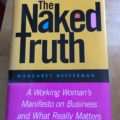“Polls suggest that acceptance of gays in the United States, the most religious industrialized society in the world, extends only up to the chapel steps.”
“I know a lot of people who want to give all the rights and privileges to gay couples that married people have, but they don’t want to change the traditional meaning of the term marriage,” said Norval D. Glenn, a professor of sociology at the University of Texas who specializes in the demography of the family. “We’re more traditional in how we define marriage in this country than is the case in most of the Western world.”
From “Why America Has Gay Marriage Jitters” By ELISABETH BUMILLER, New York Times, August 10, 2003
Oh, get over it!
“Traditional” marriage as defined by most Americans is “one man, one woman.” Add 2.5 kids, and you have the traditional nuclear family. If you’re American, tell me: how many people do you know who actually grew up in a traditional nuclear family? At age 10, I was one of the first on my block to have divorced parents. But, by now, I hardly know anyone of my generation whose parents didn’t divorce; America has the world’s highest divorce rate. So much for the “sanctity” of marriage. Are the straights worried that the gays might be better at staying married than we are? They might well be. It seems to me that, when you have to fight most of the culture around you and city hall to obtain something, you’re more likely to make it work.
Dec 3, 2003
In the New York Times op/ed page, Nov 26, Harvey Fierstein wrote: “What is it with you people, anyway? Are you so insecure about the way you handle marriage that you’re scared gay folk will show you up? Trust me, we will make as much of a mess out of matrimony as you do. Just give us a chance.”
May 3, 2004
Mike L. tells me about the Netherlands: “Gay marriages have official status since a few years. Gay couples can get married in the town hall just like hetero couples. The difference between “just living together” and being fully married aren’t that much anyway. Only real differences are that when you have kids, the father has to explicitly go to town and officially “recognize” the kid, otherwise the offspring will receive the mother’s last name instead of the father’s, and when one dies, the other may not be the only beneficiary so that you’ll have to make arrangements (usually a will or a living-together-contract) for your partner. (In our case, the house automatically becomes property of the one who lives longest, and most of the mortgage will be paid by the insurance when one of us dies).
The tax office never cared much about marriage anyway, you can just check a box on the tax form in order to have the tax office treat you as ‘partners’ (so you can share expenses and income which will in general save money).”
This pragmatic approach to human relationships seems to me a good solution. It allows every couple, straight or gay, to determine their own terms of commitment, both personal and financial, with a flexibility that realistically meets the needs of today’s rapidly-changing society
Some wise words














